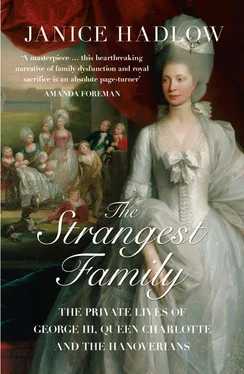Mourning for George II was subdued. His death had been expected for so long – he was seventy-six when he died, the oldest king to sit on the throne since Edward the Confessor – that the public response to it was inevitably muted. The Duke of Newcastle, whose tears were perhaps more heartfelt than Walpole allowed, was one of the few who seemed genuinely moved, declaring that he ‘had lost the best king, the best master, the best friend that ever a subject had’. 3Most other verdicts were distinctly cooler; in many of his obituaries, it was George’s least attractive characteristics – his parsimony, his boorishness and his proudly declared lack of intellectual refinement – which featured most prominently. Walpole thought his disdain for the literary world had a very direct and adverse impact on his posthumous reputation, musing that if he had pensioned more writers, he might have enjoyed a better press at the time of his death. As it was, George had never laid himself out to court approval, and his character was not one that attracted easy plaudits or unmixed admiration. In death, as in life, he remained a difficult man to love.
However, there were some among his contemporaries who looked beyond his very visible failings and eccentricities and recognised qualities of greater worth. Lord Waldegrave, once the reluctant governor to the unhappy Prince of Wales, was convinced that with time, ‘those specks and blemishes that sully the brightest characters’ would be forgotten and George would be remembered as a king ‘under whose government the people have enjoyed the greatest happiness’. 4Elizabeth Montagu, an intellectual with no inherent admiration for kings, was another who praised the late king’s somewhat undervalued virtues: ‘With him, our laws and liberties were safe; he possessed to a great degree the confidence of his people and the respect of foreign governments; and a certain steadiness of character made him of great consequence in these unsettled times.’ He had not, she admitted, been a particularly heroic figure – ‘his character would not afford subject for epic poetry’ – but she thought him none the worse for that. Indeed, she wondered if his lack of interest in the lofty and the ideal was not his best quality, praising his conviction that ‘common sense [was] the best panegyric’. 5
The old king was certainly not much regretted by the man who succeeded him. Relations between George II and his heir had not been good in the years leading up to his death. The unstoppable ascendancy of Bute had alarmed the king, who distrusted him, and the fervency of the prince’s devotion left no room in his emotional life for any other male authority figure. In private, the young George was intimidated and repelled by the king’s loud, blustering invective; in his public role, he longed, as had his father before him, to be released from the frustrations which curtailed his political actions as Prince of Wales. Only his grandfather’s death could deliver him from this limbo, and he and Bute awaited the inevitable with ill-disguised eagerness. In 1758, when George II fell seriously ill, one observer commented on the excitement with which the prince’s household greeted the news, ‘how sure’ they were ‘that it was all over, and in what spirits they were in’. 6
As his opinion of the king sank ever lower, the prince was determined that there was one area of his life over which his grandfather should have no influence. ‘I can never agree to marry whilst this Old Man lives,’ he told Bute. ‘I will rather undergo anything ever so disagreeable than put my trust in him for a matter of such delicacy.’ It was probably for this reason that, even after Bute had decisively scuppered his hopes of marrying Sarah Lennox, he made no public move to find a more acceptable spouse. In private, however, he was more pragmatic, preparing for the inescapable eventuality of an arranged marriage even as he carried on his doomed flirtation with the unattainable Sarah. Safely secluded from any potential interference from his grandfather, the prince had begun to explore more realistic matrimonial prospects. Closeted with his mother, he was spending his evenings ‘looking in the New Berlin Almanack for princesses, where three new ones have been found, as yet unthought of’. 7
When the much-anticipated moment of his grandfather’s death finally arrived, one of George’s first acts was to promote the issue of his marriage to the top of his personal agenda. He had maintained an extraordinary discipline over his desires, but did not intend to wait any longer than was absolutely necessary to become a virtuous and properly satisfied husband. Even before the old king’s funeral had taken place, George summoned Baron Munchausen, the Hanoverian minister in London, and instructed him to begin investigating potential candidates for the vacant position of Queen of England.
George had a very clear idea of the kind of woman he was looking for: he hoped to find a helpmeet and a companion who would share his vision of a morally regenerated monarchy, and who would be happy to play her allotted role in his great domestic project. Physical attraction did not rank particularly high on his list of requirements; and he was not interested in women of fashion, influenced perhaps by his great-grandfather’s unhappy experience with a high-maintenance beauty. He told Munchausen he hoped his future wife would have a good general understanding, but stipulated she should have no taste for politics. He had no desire to be managed in public life by an intellectual superior, which he suspected had been his grandfather’s fate. Not over-confident in the strength of his own character, the attributes he sought in a woman were mild, calm, unassuming ones; but equally he hoped for something more than mere colourless docility. He was keen to find a spouse who would actively appreciate his seriousness of mind, and welcome the continence and discipline which he intended should be the defining qualities of his adult life. A strong religious sense, a deep-rooted understanding of the importance of duty, and a willingness unhesitatingly to identify her interests with his own were also of prime importance. Years before, his mother had rejected a princess proposed by the old king as a possible wife for his grandson: Augusta was concerned the girl would take after her mother, intriguing, meddling and ‘the most sarcastical person in the world’. She knew ‘such a character would not do for George’. A loud, uncooperative, pleasure-seeking woman ‘would not only hurt him in his public life but make him uneasy in his private situation’. 8George knew his mother was right. If he was to have any chance of reforming kingship from within, a great deal depended on his finding the right wife.
The pool of possibilities was not large: a British king had to marry a Protestant, ruling out an alliance with the great nation states of France and Spain. George II’s daughters had taken husbands from Holland and Denmark, and a princess of Denmark was briefly considered, until she was discovered to be already promised, and dropped out of the running. Otherwise, George concentrated his search entirely within German principalities and dukedoms. Germany was the spiritual home of his dynasty; it had provided wives for his father, grandfather and great-grandfather; he was personally related to many of the ducal and princely rulers, and through them could expect to access useful knowledge about the characters and dispositions of potential brides. Germany was not only known territory for George; it was also one in which he was unequivocally the dominant suitor. He was an incomparably attractive catch, ruling a country that was richer and more powerful than most of the small princely states put together. There was little doubt that anyone he approached would consent to his invitation; the only difficulty lay in deciding whom to ask.
Читать дальше












